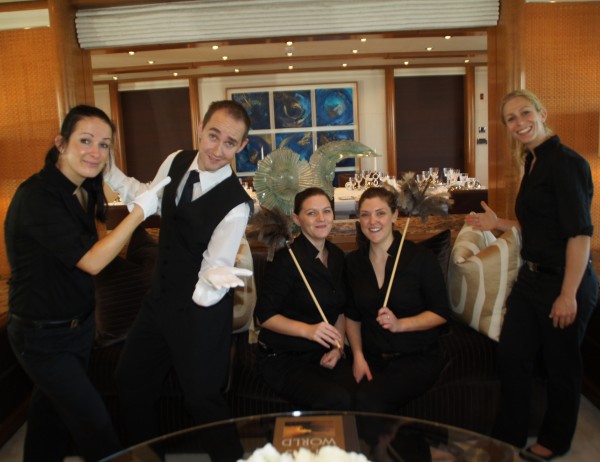Impartial training and careers advice
Call us: +441983 280 641
+441983 280 641
- How to become a Yachtie
So you’re thinking about becoming a Yachtie?
You may have a friend or relative who already works in the industry, or you have watched TV programmes like Below Deck , you know working on a yacht is the right for you, but where do you start?
With the potential to earn great money, travel, and work with loads of like-minded people, it’s not surprising this job ticks a lot of boxes for many people.
Becoming a Yachtie and getting paid to work on luxury yachts may seem like a job and industry that only the elite can have access to, or it just seems too confusing to start.
However, with an understanding of the requirements, certification, and having some expectations of what job role you should be looking for, starting work as a Yachtie will not seem so daunting.

What is a Yachtie?
Before we go any further, let’s make sure we are all singing off the same hymn sheet.
A Yachtie is a broad term used to describe anyone who works on a yacht. More specifically, it has become the term for people working as yacht crew on superyachts.
A superyacht is a very large boat that is extremely luxurious and often owned by multi millionaires and billionaires.
These Yachties who work on superyachts hold a number of different positions. Most Yachties will start their superyacht career working as a Deckhand or Stewardess. With more experience and responsibilities, your role will change as you progress up the career ladder.
It’s worth noting there are other types of yachting and Yachties. The other kind of ‘Yachtie’ could describe those who hold their Yachtmaster qualification and have jobs like skipper charter boats.
Job roles for new Yachties
Yachties new to the industry (also known as ‘Green’ Yachties) will traditionally apply for entry levels roles, which are Yacht Deckhands or Yacht Stewardesses.
These are both very different jobs, so you need to be sure which one you want to do and start training for that career path.
Yacht Stewardess (Stew)
A Stewardess, or Steward , looks after the interior of the yacht. This means anything that happens inside the boat, you will be responsible for it.
Think of any job in the hospitality industry and then combine it into one role on a yacht, that is what you will be doing.
From making beds, doing the laundry, cleaning, serving food, and hosting dinner, you will do it all to a 5-star standard. Anything less than perfect, and your guests won’t be satisfied.
It’s the small things that make the difference between high standards and exceptional standards. You must have a great eye for detail and be able to make sure no stone is left unturned. Everything on board the ship must be 100% perfect at all times.
You will be reporting to Chief Stew, who will be your manager and give you your task list. After a good few seasons as a green Stewardess, you will have enough experience and confidence to apply for Chief Stewardess roles.
Yacht Deckhand
In contrast to the Stewardess role, Deckhands look after the exterior of the boat.
Predominantly a male role, Deckhands will do everything from general maintenance to cleaning the teak deck, looking after the toys (Jet Skis, etc.), and even driving the tenders.
Deckhands should know how a yacht operates, the basic terminology used onboard, how to tie knots, and loads and loads of enthusiasm.
Deckhands may also dip in and out of helping the Stewardesses, and it isn’t uncommon for Deckhands to give a hand during busy evening meal preparation and service.
5 steps to Becoming a Yachtie
With an understanding of the job roles available, you can now decide which one best suits you. With the right attitude, qualifications, and knowing where to look for work, becoming a Yachtie is achievable for anyone who wants it.
- Have the right attitude
- Pass an ENG1 medical
- Complete STCW Basic Safety Training
- Gain experience
- Go to a superyacht marina
1. Have the right attitude
Along with gaining the correct qualifications to prove your competence, to become a Yachtie, you must have certain characteristics to thrive in this industry.
Yachties have to be well presented, articulate, know how to take orders, and be able to work hard, all with a smile and enthusiasm. You have to be able to work incredibly long hours, sometimes under stressful conditions, without losing your patience.
Having a job on a superyacht may sound glamorous, but if it’s your 10th day working in a row and you’ve got your head stuck down a toilet trying to clean it, you may want to think again. To become a Yachtie, you have to be happy with spending a lot of time away from home without seeing your friends and family. This may all seem obvious, but this situation does not suit everyone, and without careful consideration of the negatives, you will leave this industry quicker than when you arrived.
2. Pass ENG1 Medical
The first actionable step you need to take to become a Yachtie is gaining an ENG1 medical certificate. The ENG1 medical is an examination by an approved MCA (Maritime and Coastguard Agency) Doctor to make sure you are fit and able to work at sea.
Every single person working at sea must have an ENG1 medical certificate , without this, you are not able to start working on superyachts. The examination will take around 45 minutes, during which the doctor will go through a checklist to make sure you have no underlying health conditions that may impact the safety of you or anyone else on board the ship.
The most common reason new yachties fail the ENG1 is colour blindness. Surprisingly many people can go through their whole life without knowing they are colour blind. However, on board a ship, this can have huge implications. If you cannot identify signals and lights correctly, it will be impossible for you to help navigate the ship in an emergency. Unfortunately, this means you cannot start work as a Yachtie.
3. Complete STCW Basic Safety Training
Another requirement for working at sea is completing STCW Basic Safety Training . Similar to the ENG1 you can only get a job on a yacht if you have the STCW certificate.
STCW stands for ‘Standards of Training, Certification and Watchkeeping’. It is to make sure that all Seafarers have an understanding of what to do in an emergency and are aware of the procedures required.
STCW Courses are action-packed and quite a bit of fun. From fire fighting to sea survival, you will get stuck in learning, and learn loads of new skills.
4. Gain experience
If you are lucky enough to have a job offer on a superyacht, then having your ENG1 and STCW certificates will be enough.
Don’t worry if you haven’t already got a job offer, it’s quite normal to go through all these steps and not have a job lined up yet. If this is the case, gaining more experience and qualifications is a good idea to give you a competitive advantage over anyone else applying for the same job role.
This is achieved through signing up to a Deckhand or Stewardess Course. On these courses, you will get your standard STCW certificate and a list of extra qualifications demonstrating your competence, ability, and commitment to the industry.
Deckhands will learn how to drive a small yacht, engine maintenance, general yacht repair, and how to clean teak properly. Stewardesses will understand wine and how to serve it, the art of flower arranging, and how to drive a powerboat.
5. Go to a superyacht marina
After you have completed your superyacht training, now is the time to head out to France and look for work. Along with signing up to yacht crew recruitment agencies, going to one of the main superyacht marinas and handing out your CV to Captains is a great way to find work. This is known as dockwalking.
If you complete your Superyacht Course with us, you will have the option of signing up to our recruitment day in Antibes, France. We head out to France as a group, talk you through the process and offer you our industry contacts.
This is a great way to start your journey, and all our students find work in no time.
How much do Yachties make?
So you’ve heard you can make a good amount of money working on superyachts? Along with the travel, the great salary is why many people decide to become a Yachtie.
Like a job within any industry, salary varies. A Superyacht will agree on a crew salary budget with the owner of the yacht.
If you are just starting out, you can expect a salary of around €2,200 – €3,200 per month. However, the industry standard is €2,500 per month. Once you gain more experience and qualifications, your salary will increase.
When you look at the salary at face value, it looks great but not incredible, however when you are at sea, you have zero outgoings. Working on a yacht means you don’t have to pay rent, bills, or buy food which will save you heaps of money compared with working at home.
If you want to see the salaries of all yacht crew, check out our Salary Guide.
Do Yachties pay taxes?
Another reason why the salary is so appealing is that in most cases Yachties don’t have to pay tax.
This is a government scheme called the Seafarers Earning Deduction , and providing you are eligible, Yachties can keep 100% of their earnings.
To be able to apply for Seafarers Earning Deduction, you must be working on a ship outside of UK waters for a period of 365 days. This doesn’t mean you have to spend a whole year at once away from home, rather you can only apply once all the days you work on a yacht adds up to 365.
Being able to understand this tax scheme will be hugely beneficial before you start working on a Superyacht.
Download our free Guide
Want to know more about working on a Superyacht, please download our free guide .
Related articles
- Seafarers Tax
5 ways to ensure your SED claim is rock solid
The Seafarers’ Earnings Deduction, often referred to as the SED, is a tax legislation that enables seafarers to claim back their UK income tax. It a...
Do I need to pay off my Student loan if I work on a Superyacht?
Good question! First, let me say that the information below is aimed at people who have studied in the UK and took out a Student Loan to cover course ...
Have I got the right experience to work in yachting?
If you’re thinking about working on board a Superyacht, we share the skills and experience you need and how to get into the yachting industry in thi...

All guides , Deckhand , Stewardess , Yacht Jobs
How to become a yachtie.
- November 1, 2023
“Ahoy there, future yachties! Are you ready to embark on an exciting and luxurious career on the high seas?” If the idea of working on a yacht, traveling to exotic locations, and catering to the needs of the rich and famous sounds like a dream come true, then you’re in the right place. In this comprehensive guide, we’ll explore the ins and outs of the yachting industry, from the essential skills and certifications needed to make a splash, to tips on building a strong resume and making valuable connections in the yachting world. We’ll also discuss the various career paths available, from starting out as a deckhand to eventually taking the helm as a captain. Finally, we’ll delve into the yachtie lifestyle, and how to strike the perfect balance between work and play while living and working on the world’s most luxurious vessels. So grab your deck shoes and let’s set sail on this exciting journey to becoming a yachtie!

1. Discovering the Yachting Industry: Opportunities and Requirements
The yachting industry offers a wide range of career opportunities for those who are passionate about the sea and luxury vessels. From deckhands and engineers to chefs and stewardesses, there is a position for every skill set and interest. To begin your journey in this exciting field, it is essential to understand the requirements and qualifications needed for each role. This will help you determine which path is best suited for your skills and aspirations.
Before diving into the world of yachting, it is crucial to familiarize yourself with the certifications and training necessary for your desired position. For example, aspiring deckhands should obtain their STCW (Standards of Training, Certification, and Watchkeeping) certification, while engineers may need to complete an MCA (Maritime and Coastguard Agency) approved course. Additionally, it is essential to have a valid passport, a seafarer’s medical certificate, and potentially a visa, depending on the country you plan to work in.
Once you have acquired the necessary qualifications, it is time to start networking and job hunting . Many yachties find their first job through word-of-mouth or by connecting with others in the industry. Attending boat shows, yachting events, and joining online forums can help you make valuable connections and learn about job openings. Furthermore, registering with a reputable yacht crew agency can increase your chances of finding the perfect position. Remember to create a professional CV and be prepared for interviews, as competition in the yachting industry can be fierce.
2. Essential Skills and Certifications for Aspiring Yachties
Entering the world of yachting requires a unique set of skills and qualifications, which are essential for ensuring a successful career. Obtaining the necessary certifications is a crucial step in becoming a yachtie, as these credentials demonstrate your competence and commitment to the industry. Some of the most important certifications include the STCW (Standards of Training, Certification, and Watchkeeping) Basic Safety Training, which covers essential safety and survival skills, and the ENG1 Medical Certificate, which confirms your fitness to work at sea.
Aside from certifications, aspiring yachties should also focus on developing their soft skills and practical abilities . Excellent communication, teamwork, and problem-solving skills are highly valued in the yachting industry, as crew members must work closely together to ensure smooth operations and guest satisfaction. Additionally, proficiency in various tasks such as cooking, cleaning, and maintenance is crucial, as yachties are often expected to perform a wide range of duties on board. By honing these skills and obtaining the necessary certifications, you will be well on your way to a rewarding career as a yachtie.
3. Building a Strong Resume: Tips for Landing Your First Yacht Job
As a newcomer to the yachting industry, it’s essential to create a compelling resume that showcases your skills, experience, and passion for the job. Start by highlighting any relevant experience you may have, such as working in hospitality, customer service, or a related field. If you have any certifications or licenses, be sure to include them as well. When crafting your resume, consider the following tips:
- Keep it concise: Aim for a one-page resume that’s easy to read and understand.
- Use a professional format: Choose a clean, modern design that highlights your most relevant information.
- Include a personal statement: Write a brief introduction that explains your interest in the yachting industry and what makes you a great candidate for the job.
Networking is a crucial aspect of landing your first yacht job, so attend industry events and connect with professionals in the field. This can help you learn about job opportunities, gain valuable insights, and make a lasting impression on potential employers. Additionally, consider joining online forums and social media groups dedicated to yachting to expand your network and stay informed about the latest industry news.
Finally, be persistent and proactive in your job search. Apply to multiple positions, even if they’re not your ideal role, as this can help you gain experience and make connections within the industry. Don’t be discouraged by rejection – it’s a natural part of the job search process. Instead, use it as an opportunity to learn and improve your resume and interview skills. With determination and a strong resume, you’ll be well on your way to becoming a successful yachtie.
4. Networking in the Yachting World: Making Connections that Matter
Establishing a strong network is crucial for success in the yachting industry. Building relationships with fellow yachties, captains, and industry professionals can open doors to new opportunities and help you advance in your career. Attend industry events, such as boat shows and yacht crew meetups, to meet like-minded individuals and expand your network. Don’t be afraid to introduce yourself and engage in conversations, as this can lead to valuable connections and potential job offers.
Utilizing social media platforms is another effective way to network in the yachting world. Join Facebook groups, follow industry influencers on Instagram, and connect with professionals on LinkedIn to stay informed about the latest news and job openings. Be active in these online communities by sharing your experiences, asking questions, and offering advice. This will not only help you learn from others but also showcase your expertise and passion for the industry.
Finally, consider creating a checklist to track your networking efforts and ensure you’re making the most of every opportunity. This can include goals such as attending a certain number of events per month, connecting with a specific number of professionals online, or following up with contacts you’ve made. By setting measurable objectives and regularly reviewing your progress, you’ll be well on your way to building a powerful network in the yachting world.
5. Climbing the Yachtie Career Ladder: From Deckhand to Captain
Embarking on a career in the yachting industry can be both rewarding and challenging. One of the key aspects to success is understanding the various roles on a yacht and how to progress from one position to another. Starting as a deckhand , you will gain valuable experience and skills that will serve as the foundation for your future growth in the industry. As you continue to learn and develop your abilities, you will have the opportunity to advance to higher positions, such as mate, engineer, or even captain.
One of the most important factors in climbing the yachtie career ladder is gaining relevant qualifications and certifications . For example, obtaining your STCW (Standards of Training, Certification, and Watchkeeping) certificate is essential for working on any yacht. Additionally, pursuing specialized training in areas such as navigation, engineering, or hospitality can significantly increase your chances of securing a higher position on a yacht. It is also crucial to network within the industry, as many job opportunities are found through personal connections and recommendations.
Lastly, developing a strong work ethic and demonstrating professionalism at all times will set you apart from other crew members. This includes being punctual, maintaining a positive attitude, and taking pride in your work. As you continue to excel in your role and gain the trust of your captain and fellow crew members, you will be well on your way to climbing the yachtie career ladder and achieving your ultimate goal of becoming a captain.
6. Living the Yachtie Lifestyle: Balancing Work and Play on the High Seas
Embracing the yachtie lifestyle requires a delicate balance between hard work and enjoying the perks of the job. While the days can be long and demanding, the rewards are often worth the effort. To maintain this equilibrium, it’s essential to develop a routine that allows you to excel in your duties while still finding time for relaxation and personal growth. A checklist can be a helpful tool to ensure you’re staying on track with your responsibilities and making the most of your downtime.
One of the key aspects of living the yachtie lifestyle is learning how to adapt to the unique challenges of working on a yacht. This includes mastering the art of multitasking, being prepared for unexpected situations, and maintaining a positive attitude even when the going gets tough. By staying organized and focused, you’ll be able to enjoy the incredible experiences that come with working on a luxury yacht, such as exploring exotic destinations, meeting new people, and indulging in world-class cuisine. Remember, the key to success in this industry is finding the right balance between work and play, so make sure to take advantage of the opportunities that come your way.
Frequently Asked Questions
1. what are the different roles available on a yacht, 2. how long does it take to become a qualified yachtie, 3. can i work on a yacht without prior experience in the industry, 4. what is the salary range for yacht crew members, 5. what are the typical working hours and conditions for yacht crew members.

Yacht Deckhand Premium STCW

Yacht Stewardess Premium STCW

Yacht Stewardess Full STCW

Superyacht Deckhand Full STCW

Top 10 best places to find a Yacht job in the Med 2024?

Dockwalking Yacht Crew guide

Yacht Crew Salary 2024

Yacht Stewardess Salary 2024

Yacht Deckhand Salary 2024
Best superyacht training in germany – yacht crew, superyacht crew training europe.

3 next bookings get 50€ free. Use free code “yachtie50” at checkout.
2 next bookings get 50€ free. Use free code “yachtie50” at checkout
Get free yacht cv and yacht job offers

- Charter & Brokerage
- Yacht Design & New Builds
- Tenders & Toys
- Superyacht Events Calendar
- Career & Training
- Departments
- Superyacht Crew Finances
- Sustainability
- Shipyards and Marinas
- Health & Wellbeing
- Polar Region
- Our Services
- Meet the Team
6 Misidentified Truths About The Life Of A Yachtie
.png)
When a friend or family member starts talking about their job, explaining the nitty gritty details of, for example, being an insurance broker in the city – do you properly listen? Probably not. This universal habit of people talking about their jobs and others not listening is true to every industry.
It doesn’t stop with yachting; in fact there tends to be a somewhat inflated view of what people think yachting involves, the sensationalist media articles can be somewhat to blame. Whilst your friends have images of you sipping champagne on the aft deck, you actually have your head down a bilge or partaking in some adventurous sport, you are actually wandering around with cotton buds and vinegar.
So it’s time to put these misidentified truths to rest! Why not press the ‘share’ button and show the folks at home what being yacht crew is really all about.

So you work on a cruise ship
Those out there who have limited knowledge of yachts or anything nautical tend to put all marine related work under one umbrella. Superyachts travel from port to port with guests onboard, and the word ‘super’ suggests that it’s pretty big so it isn’t uncommon for people to jump to the cruise ship conclusion. After all they can relate to it. Lets cut the people some slack, I bet you don’t know every role in the insurance world…

When the guests aren’t on, you just party
No, actually not really. Most of the hard work happens when the guests aren’t on. Getting ready for charter is a long, hard task for all departments and no matter how old the yacht is, there is always never ending maintenance and to do lists – with or without guests. We may not have the normal 9 to 5 but sometimes there are regular hours in one place, carrying out everyday tasks. That said, the work hard, play hard(er) mantra is very true to yachting…

You live on a multi-million dollar yacht, so you must get VIP treatment everywhere
The crew provides this said VIP treatment and around the clock. As for away from the yacht, we return to normality, the same as everyone else.

Blue skies, sun shining and dolphins jumping, sign me up
And unicorns jumping over perfectly formed rainbows… All the time. Right? Wrong, picture a rough crossing with seasickness and waves crashing over the bow, you also don’t get to leave this unsteady office at the end of the day, with endless horizons you have days of it to come. Tropical destinations are another, people think you are sipping on coconuts whilst admiring your tan but sometimes you are walking around like a drowned rat whilst getting mud spray up the backs of your legs because its the rainy season.

You must use the yachts toys all the time
Working on board a yacht with plenty of exciting and adventurous toys can seem like a dream but it has its drawbacks. You spend your time on board constantly setting up, instructing, showing, demonstrating, cleaning, washing, fixing and putting away various toys that when it comes to your time off, sometimes you just want to leave that Seabob all cuddled up next to the full dive tanks besides the shiny jet ski alone.

Image Credit: popsugar.com
So you get to meet the rich and famous all the time
Define ‘meet’. This would be more realistic if ‘meet’ were replaced with serve, entertain and then clean up after… Also, we all know that not all your time spent in yachting is working for the rich and famous, it can also be spent working for a hedge fund manager from Switzerland.
That should clear some things up for the non (or any potential) yachties!
Superyacht Content
Related articles
The crew network – top jobs this week, superyacht language: nautical terms every crew member should know, how to keep your 2024 new year’s resolution onboard, making your superyacht a winter wonderland on water this christmas.

Popular Posts
- Girls on Deck!
- Investment Opportunities in the Covid-19 Climate
- Things I forgot to pack this charter season…
- Delivery of Mangusta Oceano – ALISA
- Sea, Sweat, and Spirit: The Ultimate Yacht Crew Wellness Odyssey
Social media influencer and digital brand expert.
Superyacht Content brings you the latest in social news for the superyacht industry.
Keep up to date with us across our social channels, and don’t forget to hit that share button!
- Superyacht News
- Superyacht Jobs
- Superyacht Marketing
Join our Newsletter
- Your Name First Last
- Your Email *
Copyright © 2023 Superyacht Content | Website Design by Zonkey
Privacy | Credits | Get in Touch
Work On A Yacht

From the Blog Subscribe Now
Yacht Stewardess – A Detailed Job Description (Book Excerpt)
December 24, 2012 By Julie Perry
“Julie from The Love Boat Ain’t Got Nothin’ on a Yacht Stew,” an excerpt from Chapter 4: Around the World with a Silver Tray — What Becoming a Yacht Stew Entails . This is a very detailed description of the duties performed by a superyacht steward/ess…
Julie From The Love Boat Ain’t Got Nothin’ on a Yacht Stew
To begin with, yacht stews are not like Julie from The Love Boat (being named Julie, you can only imagine how many times I heard that comparison), nor are they there to simply clean and serve. A yacht stew does perform those functions, but for a more appropriate comparison, think of the interior department’s role on one of these glamour vessels as equivalent to both managing and carrying out all of the tasks that go into running a five-star hotel—that floats.

Interior crew on superyachts wear many hats. Photo Credit Suki Finnerty of YachtingToday.TV
For example, first consider all of the various functions performed in the daily operation of a hotel, and who is responsible for them. There are employees to clean rooms; employees to do laundry; employees to give information and to arrange for transportation; employees to assist guests at any time of the day or night; employees to serve food and employees to prepare drinks in the restaurants, at the pool, and for room service.
Next, take that same hotel and toss it out in the middle of the ocean as though it were a cruise ship, cut off from the conveniences of being on land and having a lot of outside resources at your disposal. You must now add in employees to entertain; employees to perform in medical emergencies; employees to handle safety issues; and employees to coordinate activities, both onboard and ashore.
Now, condense all of the employees from these previous examples down to two to four individuals who share all of those tasks and perform them for 12 or fewer high-maintenance guests. On luxury yachts, the ratio of crew-to-guests is a lot smaller, and therefore there is a lot more one-on-one attention that must be paid. And, mind you, at the end of what would be considered a normal “shift,” you cannot very well escape the guests you are there to serve.
When offering the ultimate in personal service, hard work and long hours are par for the course. The crew is there to fulfill the guest’s every whim. And the yacht stews—from the chief on down to the most entry-level—are expected to pull off everything I just described, along with the occasional help of the chef(s), perhaps a purser, and/or the exterior crewmembers.
Just for fun, let’s consider what different functions this means a stew could, quite possibly, be asked to perform in a day…
As a Yacht Stew, You Might Be Expected to Be a:
Housekeeper (an umbrella role for a variety of different functions—among them Duster, Vacuumer, Smudge Remover, Silver Polisher, Toilet Cleaner, and Chambermaid, which is just a more formal way of saying Bedmaker); Bartender; Cocktail Server; Meal Server or Waitress/Waiter (who can handle anything from setting up buffets to providing silver service, who knows the difference between tea service and coffee service, who is familiar with most rules of etiquette, and who can balance plates up his or her arm on a rocking boat while running up and down tiny staircases); Table Setter and Decorator; Napkin Folder; Gourmet-Food Expert; Hors d’oeuvres Preparer; Prep Cook; Food Garnisher; Plate Runner; Wine Expert/Sommelier (who can decant wine in rough seas without spilling a drop); Barista; Provisioner/Purchaser (of beverages, toiletries, linens, decorations, décor items, games, and other amenities, sometimes even the glassware, crockery, cutlery, and other items used for serving meals); Dish Washer; Flower Arranger; In-Cabin Service Attendant; Shoe Polisher; D.J.; Concierge; Tour Director; Laundry Person; Wardrobe Manager; Expert Stain Remover; Clothing and Linens Ironer; Social Director; Event and Party Planner; Interior Decorator; Nanny; Public Relations Specialist; Personal Assistant/Shopper; Errand Runner; Stylist; Hotel Manager and Customer Service Representative; Porter or Bell Hop; Inventory Taker; Nurse; Accountant; Psychologist; Marriage Counselor; Butler; Negotiator; Diplomat; occasional Deckhand; Office Assistant; Crew “Parent”; and Fill-in Monopoly Player. Some stews even have their masseuse licenses and can offer massages to the guests (or reflexology, or yoga instruction, or manicures)… Heck, why not even come prepared with a set of tarot cards?
That’s a lot of hats you must be prepared to wear, accompanied by a smile on your face, a bounce in your step, and a “Can Do!” attitude. (How appropriate that stew—as in the kind we eat—is a “combination of ingredients thrown together.”)
In fact, the entire crew, as a whole, is expected to be ready for anything and to handle all requests, no matter how demanding or off-the-wall. A popular crew reminder given by one of my former captains just before the guests arrived: “Remember, there are no problems, only solutions.”

© Suki Finnerty Yachting Today
Guests Onboard vs. No Guests Onboard
There is a big difference in a stew’s daily routine when there are guests on-board vs. when there are no guests on-board. With guests, the crew is in service mode. This is when the workload is toughest on the interior staff. The hours can be grueling, and a stewardess must be available at all times—from dawn until the wee hours of the morning (depending on when the guests retire). Members of the stew department must be organized and prepared to provide effortless service throughout the trip, no matter what mishaps occur behind the scenes. But remember, this is a team effort. (No stew is an island, unless he or she is working on a small yacht, under 100 feet!)
The daily responsibilities are much different when there are no guests on-board. Then, the job is more about maintaining the yacht and cleaning and preparing for the next group of guests. The hours during these guest-free periods will more closely resemble those of a regular land job: 8 a.m. to 5 p.m., with either a half-day on Saturday, or the entire weekend off. The exception to those work hours would be if the crew is pressed for time between trips. Heavily booked charter yachts are known for having only a two- or three-day turn-around between sets of guests, which requires longer days (hence, the big tips you get on charter boats). On the other hand, some private yachts and chartered vessels can go weeks or months with no guests.
Other scenarios with no guests on-board are when the yacht goes into the shipyard for repairs or undertakes a long journey to relocate, such as a transatlantic crossing. Then, the lion’s share of the work falls onto the exterior and engineering departments, giving the stews a bit of a break (and the deckhands a reason to complain).
The 2nd Edition is now available ! In the meantime, please feel free to download Chapter 1 here . Why wait to get started!?
About julie perry, our latest tweets, get our email newsletter.
- Name * First Last
- Email This field is for validation purposes and should be left unchanged.

Fast & Free Shipping To The Continental US
Orders placed by 2pm est m-f ship same day, safe & secure checkout, 100% satisfaction guarantee, fast & free shipping to the continental us. orders placed by 2pm est m-f ship same day., what does it take to become a yachtie.
- January 5, 2019
- by Austin Frye
So you caught a glimpse of a beautiful yacht sitting in the harbor and saw the crew hard at work serving guests and keeping the vessel in Bristol shape? Quietly you said to yourself… “that seems like an awesome job, how do I throw my hat in the ring for that job and become a real Yachtie?!”
Fear not, I’m here to help guide you through the process of getting your first crew job and donning the official title of Yachtie. But please be warned there are hazards associated with working crew on a yacht:
- You may have feelings of euphoria and will never look at a traditional 9-5 in the same light
- Your tan will definitely be the envy of all your friends
- Your passport will rack up some unique stamps along the way
- Most importantly, at the end of the day, you’ll have a blast doing what you do for a living
Once you hop onboard and go down the path to becoming a yachtie it becomes much more than a job, its a lifestyle. You spend your days on the water, in the sun, smelling the crisp salt air, not adhering to a traditional schedule. There’s nothing better and the longer you stay in the game the harder it becomes to give up the life.
Now that you’ve been properly warned about the side effects of becoming a yachtie. Let’s dive into the nitty-gritty of what it actually takes to hop on one of these beauties and care for her. For starters, take a mental note of what kind of boating skills you have. Are you a complete newbie having never washed one and have only gone out for the occasional sunset cruise on a friends boat? Or are you a seasoned salt ready to tackle anything Mother Nature or the yacht throws at you.
What does a Yachties typical day consist of?
Before I give you the requirements for landing your first gig on a mega or superyacht, why don’t we take a look into the daily life of a yachtie and see if you’re up for the task. You start your day off by getting up before your owners or guest, which in some cases is pretty early. So if you’re not a morning person the yacht crew life may not be the life for you. Then you hit the decks and chamois dry the whole boat. Be sure to remove fingerprints off of the stainless and make sure those windows look crisp! Then you take all the covers off of the cushions and make sure the boat is ready for your owners to enjoy.
After you get the boat squared away then you can grab some food for yourself. By this time the owners are usually stirring and ready to enjoy an action-packed day onboard. Usually, they’ll take it easy during the mornings. Then they’ll want to leave the dock, go for a slow cruise then throw the hook. Be sure to put every toy in the water including skis and tubes and have dinner on the hook. After you’ve watched another beautiful sunset its time to head back to the dock. From there your guests will continue to enjoy some drinks and some quality time onboard.
Finally, they decide to call it a night. You cover the boat up and crash yourself. Then in the morning rinse and repeat. Eat, sleep, yacht, repeat.
Now that you have a gist of the daily grind, what background do you need to hop onboard your first gig?
1. Hone Your Deckhand Skills
First, I would start getting some basic skills down pat, if you have none. Learn how to properly wash and care for the aesthetics of a boat. See if any local detailing companies are looking for an extra set of hands for their weekly care customers.
2. Search For Day Work
After you’ve got washing, and chamois’ing down pat, lets log some sea time. If you have friends who are day captains see if they are looking for a mate. Chances are they need a good, reliable mate.
Do some trips with them, you’ll develop a good rhythm of what it takes to get various size boats on and off the dock. It racks up those coveted days on the water so you can earn your ticket down the road.
Honestly, I love day work, moving different boats around for dealers, its a chance to experience so many different systems and trips and not the same routine like being full-time.
3. Get Your Certifications
After all of this, do you still have burning desire to embrace the yachtie lifestyle? I hope so…
Now its time to hit the classroom. In order to crew on a larger yacht at a minimum, you need your STCW 95. Which stands for, Standards of Training, Certification, and Watch-keeping for Seafarers.
The course consists of 5 elements and will take 5 days to complete. In order to successfully obtain it, you need to complete all five elements.
- Personal Survival
- Fire Fighting
- First Aid & CPR
- Personal Safety and Social Responsibility
- Proficiency in Security Awareness (PSA)
Like anything else, this certification helps to show captains, and owners you mean business and aren’t trying to just hop on cause its “cool” to work on a boat.
4. Grow Your Network
After you received your certification, its time to start networking. The best opportunities within my boating career have come through my network, time and time again. If you took my advice above about working for someone cleaning boats or hopping on a delivery or two chances are you’ve met some key players in the game. But remember that day work is also good for something else, building references. Any captain and owner is going to want to make a few phone calls to get a feel for you.
While building your network up of captains, deckhands, brokers and anyone else who can help you accomplish your goal of landing your first gig on a yacht, you need to work on your resumé.
5. Craft The Perfect Resumé
Your resumé needs to paint a picture of who you are. Illustrate how energetic you, that you’re a team player ( a must considering you’re putting your life in the hands of those you sail with, things can happen in a split second on the high seas.) Make sure to get a nice headshot, that’s an industry standard to attach to your resumé.
Think long and hard about what truly sets you apart from everyone else vying to become a yachtie. What makes you memorable next the other persons application in the pile? This will help you to get captains to pick up the phone to speak with you, without knowing you personally.
6. Work With A Crew Placement Agency
Once you’ve dialed in your resumé and you’re ready to fire it off but where do you send it? A job board? Hang it at a marina?
Your best bet would be to register with a superyacht crew agency. There are a variety of ways you can go about this. Do a google search for an agency and you will yield a bunch of good results to inquire with.
Another way would be to do some research into large brokerage houses. They typically have a crew division, helping to place crew with newly sold boats or signup with larger boats to help place when someone leaves a boat.
Those are the two best avenues to help get your phone to ring. But like anything else don’t just wait for the phone to ring. Stay in touch with your placement agent be top of mind so when their phone rings with an opportunity it’s your number they dial first!
Be proactive and keep in touch is some of the best advice I can give, being in the right place at the right time will be the difference a lot of the time from getting landing that yachtie gig and it going to someone else. Talk to the captain who you helped with day work, your broker friends, you never know they could have just hung up with someone looking for crew!
To Sum It All Up
Lastly, while you’re waiting to land that first full-time yachtie opportunity, keep doing day work. It is the most valuable way to hone your skills before you hop onboard a larger yacht and will give you the confidence to excel in your newfound career… I mean way of life.
So go out there and make your dream a reality and get lost in the yachtie culture, you won’t regret it. You already took the first step and researched how to get your foot in the door.
If you need some help figuring out how to get started if you’re still struggling feel free to reach out.
Leave a Comment Cancel Reply
You must be logged in to post a comment.
This site uses Akismet to reduce spam. Learn how your comment data is processed .
You Might Also Like

Buffing Compounds for Boats: Choosing The Right One

A Guide to Essential Boat Washing Tools

How To Clean & Care For Your Microfiber Towels
See what people are saying, see what people are saying .
“We detail and service over 400 boats per year between the Great Lakes & South Florida, the results we achieve with all of YACHTE’S products for our customers makes our job that much easier!” – Dave YACHTE Customer
“I was happy I found YACHTE, every product I use from their line provides me with amazing results I have been searching for, for years! And their customer service goes above and beyond.” – Jason YACHTE Customer
“Being a full time captain with a busy program doesn’t leave us for much time to turn the boat around. YACHTE products make our lives easier onboard in-between trips. The boss always compliments how good the boat looks! ” – Chad YACHTE Customer

- Standard Courses
- Career Progression Courses
- Additional Training
- Pricing and Packages
- STCW 2010 Course
- Stewardess Course
- Testimonials
Latest News
Home Courses Step-by-step process of finding a job as a yachtie

Step-by-step process of finding a job as a yachtie
Working aboard superyachts in beautiful destinations is an exciting, rewarding, and once-in-a-lifetime opportunity. The ultimate aim is to land a position aboard a superyacht, but getting started in the field can be scary. It’s a well-known fact that yachting is challenging to get into. It’s highly competitive and the journey to get to that long-term career isn’t always obvious.
So how can you ensure you have the best chance of landing your ideal position on a superyacht? Our walkthrough guide is intended to assist you in understanding the step-by-step process, making it easier for newcomers to break into the field confidently, knowing what’s in store. We’ve broken down the process to make it easier for you. Here is the step-by-step process, from beginning to end, of what to expect in your journey to becoming a yachtie.
Step 1 – Deciding to become a yachtie
You may know someone who already works in the field through a friend or cousin, or you may have seen TV shows like Below Deck and decided that this is the career for you; now you just need to find out where to begin. It’s not surprising that this career checks many people’s boxes, given the opportunity to make excellent money, travel, and work with many like-minded people.
You need to decide on the below 3 things:
- What season do I want to join? ( A season is when the owners are using their yachts. USA/Caribbean season – November – February. Mediterranean season – April – September)
- What visa do I need to apply for and get it before I want to leave?
- What position do I want to apply for and what courses do I need to take?
Do I have enough money to begin? You need between R100 000 – R120 000 saved before you start on this journey. This is for courses, ENG1 medical, visas, and flights. The most significant expense is when you get overseas, as it can take up to 3 months to find work. You must make enough money to live off until you find work. The salaries on the yachts are tax-free, and most of your expenses are covered by the yacht (accommodation/food/medical aid)t, so you stand to make a lot of money, but you need to invest money in yourself first.
Once you decide this is your career, contact Super Yachting South Africa (SYSA). We are leaders in premium superyacht training in Cape Town and have trained thousands of yachties. You can email [email protected] or call us on +27 78 099 2931, and the team will take you through the courses we have available and decide the route you want to take – either a deckhand or stewardess route.
Step 2 – Booking the courses you need to work on superyachts
It might be challenging to understand the various yachting certifications necessary for each function onboard a superyacht. Whatever your goals, every yachtie needs to complete the STCW Basic Safety Training . Our team will also guide you on which courses you need to book. The majority of our students book the classic course package . This package includes the following courses:
- STCW Basic safety training
- SYSA Deckhand training course
- RYA Powerboat Level II
- RYA VHF Radio
- RYA PW/Jet Ski
- RYA Tender operator
Just to be safe and not waste your time, we recommend doing the ENG1 course beforehand if there are health issues or you suspect you might have health issues. The ENG1 is a medical examination set by the MCA (Maritime and Coastguard Agency) to assess whether individuals are fit to work on a seagoing vessel and perform duties at sea.
Step 3 – Making travel arrangements
*This step applies to all students not based in Cape Town. Next up, it’s time to make plans for your stay in Cape Town, South Africa, to complete your course. You need to secure your accommodation in Cape Town for the duration of the course (and maybe an extended stay to travel and explore the city after), investigate visa options for South Africa if you’re travelling from overseas and book your flights.

Step 4 – Complete the courses with SYSA and get certified
This is one of the most exciting steps, getting to join our courses and get certified. Our training takes place in the marina at the popular V&A Waterfront, Cape Town. It’s the perfect backdrop for learning everything superyacht related. The students on our courses not only learn so much but make lifelong friendships which start at the training. The experience amongst SYSA’s current team of instructors has never been at a higher and more dedicated level. Our team of instructors emanate from global experience and nationalities, with the highest-ranking maritime qualifications.
We never compromise on the equipment, boats, jet skis and motor yachts used for training. SYSA guarantees a commitment to excellence in training, mentorship and the necessary resources to begin your journey into the world of super yachting.
Step 5 – Create your CV
Your marketing brochure is your yacht crew CV. It’s the door to your future and serves as a shop window for potential employers to see what skills you have to offer. It’s vital to have an updated CV on hand. Make sure your CV is tailored to finding yachting jobs, highlighting your yachting qualifications as well as any land-based hospitality jobs that may be relevant and any additional languages or skills that make you a competitive candidate.
We put together a helpful article for creating the best super yachting crew CV here.
Step 6 – Put yourself out there and start getting ready to go overseas to look for work
Networking is the only way you will find work in the beginning when you have no experience. Marketing and selling yourself is the key to success. Once you’ve completed your courses, it’s time to immerse yourself in the industry. Joining yachting groups/platforms on social media and in real life is a great way to start networking before you leave for overseas. You will also need to sign up with all the recruitment agencies before as there is a lot of administrative work involved. When you have no experience in yachting, the only way to find work is to physically go to where the yachts are based, as they want to see how you come across in person.
Every yachting destination has a season, which means when the owners use the yachts. So you need to decide what seasons you want to join and start planning to get over to look for work at least six weeks before the season begins. Being based at the right place at the right time, you’ll be in a prime position to hand present your resume to prospective employers.
Step 7 – Dock Walking
Once you arrive at your yachting destination, you can try dock walking and meeting up with agencies. An excellent approach to finding work is through dock walking. It is customary to practically stroll the docks and marinas, stop by crew agencies, and even go to the bars and cafes frequented by the current crew to get crew jobs. Every dock walk should be seen as an opportunity to network with people in the yachting industry, discover new information about the sector, and establish relationships with people who can help you in the future. Don’t be discouraged if it takes longer than expected to find the perfect job onboard. At this point, you need to network like your life depends on it and frequent the places the local yachties frequent – usually near the docks.
Step 8 – Landing that dream job
Once you land that interview, prepare and make sure you get that job. Once you land the job, you should celebrate. Now that the hard work of job searching is behind you, it’s time to celebrate and enjoy your new adventure in the world of super yachting.
If you’re interested in pursuing a career in super yachting, take a look at our courses and contact Georgina at [email protected] .
Leave a Comment Cancel Reply To Comment
Save my name, email, and website in this browser for the next time I comment.
Yacht Training Courses
- Standard Yacht & Offshore Courses
- Yacht Career Progression Courses
- Additional Training for Yachts
- Royal Yacht Academy (RYA) Courses
- Yacht Stewardess Courses
Recent Posts
- A Parent’s Guide to a Superyacht Career for Your Son or Daughter.
- Interested in a job on a superyacht but don’t know where to start?
- Advanced your super yachting career with the RYA Day Skipper Theory Course
- Essential courses for superyacht crew preparing for the 2024 Mediterranean season
- SYSA launches exciting apprenticeship program for former students
Blog Categories
Get in touch.
Get in touch with our team to find out more about superyacht career training and what one needs to become a crew member on a superyacht. *Please note that we respond within 24 hours.
Email Address
Phone Number:
Course Type Interested In:
Standard Courses Career Progression Courses Additional Training Stewardess Course
Message: Would you like to receive our monthly newsletter?


The Four Essential Factors to Becoming a Yachtie
Breaking into the yachting industry is like setting sail on a thrilling journey filled with first-time experiences.
Picture this: living in a new country, mingling with folks from far and wide, managing your budget with the precision of a sea captain, and, of course, networking over a few cold ones in the local pub – because, let’s be honest, that’s where the real magic happens!
Now, before you hoist your sails and set off on this maritime adventure, there’s a checklist you’ll want to navigate through. It’s not just about earning your sea legs; it’s about ensuring you’re well-prepared for the nautical challenges that lie ahead.
First and foremost, let’s talk paperwork – the unsung hero of any overseas escapade:
1.International Health/Travel Insurance: It’s not just a safety net; it’s your golden ticket to a visa. Without it, you might find yourself adrift in a sea of paperwork.
2.International Bank Account: A sailor needs a sturdy ship, and you need a reliable bank account. Setting up an international account ensures smooth sailing for your finances, wherever the winds may take you.
3.Crew House Accommodation: Think of it as your home port. Finding the right crew house is like dropping anchor in a safe harbor – a place where you can rest your sea legs and share tales of the open sea with your fellow shipmates.
4.Visa: Ahoy, legalities! Securing a visa is like charting your course; it’s a must for a smooth entry into your chosen maritime realm.
Download The Checklist Now

1. International Health Insurance/ Travel Insurance
Picture this: You, the adventurous greenie, diving into the yachting realm. But before you do, make sure your ship is fortified with international health insurance. It’s not just about travel insurance; it’s about long-term coverage that ensures your well-being in uncharted waters.
Tip: Your health is your greatest treasure, so invest wisely in international health insurance to ride the waves worry-free.
International health insurance : Setting Sail with Peace of Mind
International Health Insurance is like a treasure chest of wellness, specially crafted for individuals and families embracing life beyond the familiar shores. It’s your guardian on foreign soil, ensuring you’re covered for medical storms that might come your way. Here’s what it brings to your seafaring journey:
- Comprehensive Healthcare Coverage: Think of it as a sturdy lifeboat, offering protection against medical expenses that might rock your boat while you’re traveling, living, or working abroad.
- Emergency Assistance: In the vast ocean of unfamiliar healthcare systems, this insurance is your compass. It ensures you get the support you need, precisely when you need it, providing a lifeline in times of medical distress.
- Peace of Mind Abroad: Picture it as a reassuring lighthouse guiding you through the challenges of foreign healthcare. With international health insurance, you’re not just a traveler; you’re a well-protected explorer.
So, as you set sail into the unknown, let International Health Insurance be your compass, navigating you through the waters of global well-being.
Travel insurance : Your Shield Against the Unexpected
Ah, the open road and unforeseen adventures – that’s where Travel Insurance steps in as your steadfast companion. It’s your shield, protecting you from unexpected twists and turns during your journey. Here’s what it unfurls:
- Trip Cancellations and Interruptions: Sometimes, plans change. Travel Insurance ensures you don’t bear the full brunt of unexpected cancellations or interruptions.
- Medical Emergencies: When health hiccups threaten your travel bliss, this insurance is your remedy, covering medical expenses that might otherwise weigh anchor on your finances.
- Lost Luggage and More: From misplaced luggage to unforeseen circumstances, Travel Insurance has your back, providing financial security and peace of mind throughout your expedition.
So, whether you’re chasing sunsets or exploring distant lands, let Travel Insurance be your loyal sidekick, ensuring your journey is filled with excitement, not unexpected financial storms.
The Difference Between International Health Insurance and Travel Insurance
International health insurance: Imagine International Health Insurance as the compass guiding you through the seas of purposeful living abroad. Whether you’re working on a mission, pursuing a passion, or simply exploring the world with intent, this insurance is your dedicated ally. Here’s how it aligns with your purpose:
Travel Insurance: Travel Insurance is like the protective cloak for your globetrotting escapades, tailor-made for the spirited souls seeking short-term thrills. It’s not just a safety net; it’s a well-crafted map to navigate unforeseen events during your journey.
Medical Coverage
International Health Insurance:
Comprehensive Medical Coverage: Think of it as your health ally, offering coverage akin to what you cherish in your home country. It’s not just for emergencies; it’s there for routine check-ups, managing chronic conditions, and even elective procedures – supporting your purposeful health goals.
Focus on Long-Term Healthcare: As you carve out your path abroad, this insurance stands by your side, focusing on the long-term. It’s not a temporary fix; it’s a commitment to your well-being over the duration of your purposeful journey.
Routine Check-ups and Elective Procedures: It’s not just about reactive care. International Health Insurance empowers you to proactively prioritize your health with routine check-ups and elective procedures, ensuring you stay in peak condition to fulfill your purpose.
Travel Insurance:
Travel Insurance is like a trusty compass, ensuring you’re protected from unexpected health storms during your exciting journeys. While it’s not a comprehensive health plan, it stands tall as your go-to for basic medical coverage in times of emergencies. Here’s why it’s your steadfast ally:
Basic Medical Coverage for Emergencies: Think of it as your emergency health kit, providing coverage for sudden injuries or illnesses that demand immediate attention during your trip. It’s your safety net for unexpected health twists and turns.
Hospitalization and Ambulance Services: In times of crisis, Travel Insurance is your anchor, covering expenses related to hospitalization and ambulance services, ensuring you receive prompt and necessary medical care.
Emergency Dental Care: Even your pearly whites are covered! Travel Insurance steps in to assist with emergency dental care, because who wants a toothache disrupting their adventure?
Not Suitable for Existing Conditions: While it’s your hero for unforeseen events, Travel Insurance isn’t designed for managing pre-existing conditions or long-term healthcare needs. It’s your knight in shining armor for immediate health concerns during your journey.
International Healt Insurance: International Health Insurance is not just a safety net; it’s a long-term partner, tailor-made for the adventurous souls working on yachts for extended periods. Picture it as your health compass, guiding you through the waves of life on the high seas. Here’s why it’s your dedicated health ally:
Extended Coverage Period: Unlike a brief voyage, International Health Insurance is crafted for the long haul. It often covers individuals for years, providing consistent and continuous health protection as you navigate the challenges and triumphs of life on the yachts.
Monthly Policies for Flexibility: Yachties, in their nomadic spirit, can opt for health insurance policies that operate on a monthly basis. This flexibility is particularly popular among yachties who may find themselves between jobs overseas and need continuous health coverage beyond the typical travel insurance limits.
Overcoming Travel Insurance Limits: International Health Insurance comes to the rescue when yachties exceed the 120-day limit of standard travel insurance. It ensures that your health remains a top priority, no matter how long you’re sailing the open seas.
Travel Insurance:
Travel Insurance is like a temporary guardian angel, ensuring your short-term adventures are filled with excitement rather than unexpected worries. Tailored for the duration of a specific trip, it’s your safety net from takeoff to touchdown. Here’s why it’s your steadfast ally:
Trip-Specific Coverage: Picture it as a tailored cloak for your journey. Travel Insurance is designed to cover you for the specific duration of your trip, whether you’re embarking on a weekend getaway or an extended exploration lasting several weeks.
Range of Days Covered: From quick city escapes to epic journeys, Travel Insurance has your back. While it typically covers you for 90 days, it adapts to the varying durations of your adventures, providing financial security and peace of mind throughout your trip.
Temporary Protection: It’s not a lifelong commitment; it’s a short-term promise. Travel Insurance steps in to offer protection during the window of your travels, ensuring you’re covered for unforeseen events like medical emergencies, trip cancellations, or lost luggage.
So, whether you’re exploring ancient ruins, basking on tropical beaches, or savoring the rich culture of a new destination, let Travel Insurance be your trusty companion, ensuring your short-term journeys are worry-free.
Without any form of travel insurance or medical insurance, you will not qualify for a schengan visa . We recommend that all our yachtie clients invest in international health insurance before they leave South Africa as you will not have to worry about organising your health insurance while you are looking for a job or on board working. It will also ensure you are covered medically in the event of an illness or injury that requires medical attention.
Boats Only Cover Their Crew Under Certain Circumstances
Another key reason why greenies should invest in international health insurance is because boats only cover their crew under certain circumstances:
– if an injury or illness occurs during working hours and while you are on the boat.
– If you are injured off the yacht or out of working hours, you will not be assisted by your boat with medical bills.
2. International Bank Account
Now, about those pennies for the pub and keeping your funds afloat. Don’t let exhibition bank fees weigh you down! Secure an international bank account tailored to your passport type. South African greenies, say ahoy to the Transfer Wise Account, a multi-currency haven. Foreign passport holders, set sail with the Revolut Bank Account – no hidden costs or commissions, just smooth sailing.
Land Ahoy: Once you’ve got your sea legs, the Standard Bank Isle of Man account awaits, making your financial voyage secure and versatile.
An International Bank Account for a South African Passport Holder
Greenies who only have the green Maamba (SA passport) are able to qualify for the Transfer Wise Account, which allows them to bank online internationally. It is a multi-currency account that allows you to send, receive, and hold money in over 50 currencies. Yachties can hold up to 5 different currencies in this account, which is perfect for their lifestyle.
International Bank Account for a Foreign Passport Holders
Yachties with a foreign passport are able to open an international bank account through the Revolut Bank Account . Over 30 currencies can be held and exchanged, and the greatest benefit is that there are no hidden costs or commissions.
Once You Have a Job
When you are employed on a yacht, you will qualify for the Standard Bank Isle of Man account (not related to the South African Standard Bank) which is a multi-currency account and allows you to hold and manage money in over 20 currencies. This bank account allows you to choose up to 5 currency accounts and is very secure! You will need to provide the bank with the following:
- Proof of contract
- Letter from your captain
- Copy of your captains Seafarer Book

3.Crew Accommodation
Crew houses – the social hubs of the yachting world. Dive in for networking, dock walking, and friendships as sturdy as a well-rigged sail. Stay for a couple of weeks, get the lay of the land, and then venture into Airbnb with your newfound crew buddies. Choose wisely, like you’re picking the perfect anchor mate!
Note: Crew houses are the heart of your yachting social life; choose wisely, matey!

Ah, the golden ticket to international waters! Navigate the visa maze with a holiday visa giving you 90 days to find your dream yacht job. In Europe, get ready to set sail without a visa while onboard, and in America, secure a B1/B2 visa for smooth sailing.
Warning: Work in America on a holiday visa? Brace yourself for rough seas; it’s not a smooth ride!
In Europe
Once you join a boat you will be stamped onto international water. You don’t need a visa while onboard. However, when you fly home you will get a transit visa that the boat will organise.
In America
The American embassy may issue you a B1/B2 visa , which allows you to work and visit the US. Once you have a job, you’ll need to fly out of America and re-enter. If you work in America on a holiday Visa, you will be faced with a lot of trouble.
With international health insurance, a savvy bank account, crew connections, and the right visa in your treasure chest, you’re all set for the grand adventure! Your journey as a greenie is about to unfold, and we’re here to ensure it’s nothing short of a maritime masterpiece.
Clarity Employee Benefits is an authorized Financial Services Provider – FSP No. 51007. We specialize in international health insurance and travel insurance for yachties, please do not hesitate to contact us if you are in need of health insurance guidance or advice.
Secure your Yachtie Health or Travel Insurance Policy Today!
Simply complete the form below and click ‘submit’ to submit an international health insurance inquiry. Our customer service team will get in touch with you within 2 business days.

Everything you need to know about being a superyacht chef
- Chef Interviews
- Beach destinations for yacht chefs and foodies
- The Ultimate Port Guide: Rybovich, West Palm Beach, Florida, USA
- The Ultimate Port Guide: Berth One, West Palm Beach, Florida, USA
- The Ultimate Port Guide: Savannah Yacht Center, Georgia, USA
- The Ultimate Port Guide: Port Denarau Fiji
- The Ultimate Yachtie Guide To Antibes And Cote D’Azur
- The ultimate Yachtie guide to Barcelona, Spain!
- Dockwalking for yacht chefs [updated 2022]
- The Ships Cook Certificate: What you need to know
- How to get a job on a super yacht as a chef
- Private Vs Charter
- Starting as a crew chef
- Superyacht crew agents
- What certificates does a Superyacht Chef need?
- Working as a yacht stewardess vs crew chef
Yacht crew in the wild
- Yacht Chef Job Board
- 5 Best Cookbooks for 2019 for yacht chefs
- 5 of the best chef gadgets for 2019
- 5 knives every chef needs in their knife roll this season
- The Yacht Chef cookbook of 2020 : The mymuybueno cookbook
- Short order
- cooking classes
- Crew Food: How It Can Make Us Better Chefs
- Crew meal ideas
- Crew Preference sheet free printable
- Crew Weekend Food Ideas
- Sample Yacht Chef Menu
- The BEST vegan cookbooks for yacht chefs
- Writing a killer yacht chef cv is easy!
- Worldwide Superyacht Provisioning Spreadsheet
- Yacht Chef Websites
- Work with us

Yachties are a not-so-rare breed now, with well over 100,000 people calling themselves yachties, or yacht crew these days.
And that number is rising, what with all of those yacht crew who are streaming into Antibes every season (Looking at you, South African influx) and Florida (This one goes out to everyone who watched a season of “Below Deck” and declared they wanted a gap year!)
Yachties are dime a dozen. But really makes us stand out?

Where to find yachties?
Hardly an exclusive bunch, it’s easy to find yachties if you are looking in the right stomping grounds.
Rybovich bar in West Palm beach , The Hop Store in Antibes, and Corner Bar in Palma De Mallorca are the 3 main yachtie hotspots.
Of course, there are always rouge yacht crew who roam off the beaten track and make it as far as Clematis Street, Juan Les Pins and Santa Catalina. #sointrepid.
The latest yachtie trend is buying scooters to get around in ports. A few old-timers are still cruising the docks on skateboards but recently more yacht crew have invested in portable scooters. As dorky as they look, the range for exploring further afield from the dock is one positive.

Yachties are almost always at a bar
Once shore leave has been granted, yacht crew disperse to the nearest bars to sink copious amounts of beer, gin and rosé. (More on that later.)
The local bar is akin to a yachties crew mess when they hit land.
If the boats docked in a smaller village like La Seyne-sur-mer you can guarantee that the only bar in town will be full of rowdy yacht crew every night until the boat pulls out. Expect to see yachties come in and greet the owner and staff by name.
Yacht crew hunt in packs
Rarely will you see a yachtie sitting at a cafe with their head buried in the literary works of Shakespeare alone. Oh no, fellow yachties are almost always in groups.
As soon as that boats tied up and wash down is complete, you can bet that everyone who is not on watch will head to the bar together. Never mind they have been at sea or on charter and in each other’s faces for weeks on end. The start of the night will always happen with a solid group.
Inadvertantley, everyone splits up eventually. Often the couples will branch off (fine) and the boys seperate into their own smaller wolf packs, ready to hit up local girls or someone they swiped right on earlier that day. Most of the girls tend to stay in bigger groups. Safety in numbers, right?
All they talk about is boats
No, but really. How big is your boat?

Yachties will be the loudest ones in the bar
And they all have exotic mish-mashed accents from far-flung places. Expect to be confused about where some of them are from. Is that a Kiwi accent? Aussie? Canadian? what is that accent?!
They always say Americans are the loudest travellers. Well, those people have never been to a yachtie bar. South Africans and Australians will literally compete across the bar for who last the biggest lungs.
You will hear a yachtie long before you see him.

What does a yachtie look like?
All yacht crew have the same golden kissed skin from working out doors. Hours spent in the summer sun will have many of them glowing, literally radiating summer vibes on everyone nearby.
Unless you are talking to a stressed out pasty white chef who hasn’t seen daylight in weeks or slept. Yacht chefs and engineers are the whitest crew on a boat. Don’t expect much conversation out of them for the first hour either, they need to warm up with half a bottle of whisky first.
Traditional yachtie attire consists of a pair of Havaianas, usually black. The boys usually have a watch, worth at least a months salary. The rest of their clothing is casual casual . Not smart casual, but boardies and teeshirt kind of casual.
Rarely will you see them force themselves into a button-down shirt. It’s usually under duress from their yachtie girlfriend before a crew dinner, if ever.
Yachtie girls just look like Instagram models with their perfect ombre hair. The trick to getting this hairstyle just right is to work so much that you aren’t able to touch up the roots all season. Girl’s ain’t that the truth!?
Throw in a wardrobe of clothes from all around the world and yacht chicks go from Below Deck to shore ready in about 4 hours. Shrieks of “What even am I going to wear?!” echo down every crew corridor on drop off day.

Everyone is drinking
Being at sea for long periods of times is thirsy work. Your new yachtie friends will drink you under the table, so don’t even try to challenge them. Expect the bar tab to have a few 0’s on the end of it too. Yachties seem to have a penchant for the expensive tipple and high end cocktails.
If it’s a Sunday, they will be the ones at brunch churning through magnums of Rose.
Expect to see them downing shots of patron XO or fireball on a Monday night or espresso martinis at 4pm on a Friday when they wrangle an elusive early finish.
Yacht crew work on airport drinking rules- any time is game for alcoholic beverage or seven.

They are the friendliest people in the bar
The more the merrier with yacht crew.
You will often see groups of yacht crew merge into bigger groups as everyone makes friends. Many nights our start with your own yacht crew for drinks, and end up being groups made up of 3, 4 or 5 different boats all hanging out.
Yachties might be hanging in packs, but they aren’t very threatening. What with their beautiful smiles and good looks? Cheeky sense of humour and impeccable banter? Yacht crew are a bunch of really good counts*.
*Intentional spelling mistake 😉
Share and Tag a yachtie who needs a laugh!
RELATED: Mental health resources for yacht crew
This was a guest post.
One Comment
This article had me laughing so much!!! (Insert laughing emoji) Insanely spot on in every aspect from the white chefs who haven’t slept in weeks to the expensive watch on the deckies and girls with nothing to wear on drop off day. First world problems, thanks for the summary of the people in this industry we know and love.
Jess The Seaworthy Stew http://www.theseaworthystew.com
Leave a Comment Cancel
Your email address will not be published. Required fields are marked *
Email Address *
Save my name, email, and website in this browser for the next time I comment.
How to get a job as a superyacht chef
300+ free crew food recipes, yacht chef portfolio websites.
A creative space for Superyacht Chefs to share and engage. List your jobs, apply for jobs. Share knowledge and opinions. Celebrate your wins. Get yacht chef related discounts and insider help.
New to yachting? Green Yacht Crew? : Start HERE!
Professional yacht chef cv writing, yacht chef cv writing tips, recent jobs.
- Fort Lauderdale
- Never Enough ll LLC
Click here for our favourite yacht chefs ;)
What are the benefits of being a yachtie?

1. Travel Opportunities
2. high earning potential, 3. professional development, 4. networking and connections, 5. luxurious lifestyle, 1. what qualifications do i need to become a yachtie, 2. is it necessary to have prior experience in the yachting industry, 3. how much time off do yachties get, 4. are there opportunities for career advancement in the yachting industry, 5. what are the challenges of working as a yachtie, 6. are there any health and safety considerations for yachties, 7. what positions are available for yachties, 8. can being a yachtie lead to a long-term career, 9. what is a typical day like for a yachtie, 10. are there any age restrictions for becoming a yachtie, 11. what are the living arrangements like for yachties, 12. how can i find job opportunities in the yachting industry, what are the benefits of being a yachtie.
Being a yachtie, or working in the yachting industry, comes with a multitude of benefits that make it an attractive career choice for many. Whether you’re drawn to the open seas or the glamorous lifestyle associated with luxury yachts, there are numerous reasons why being a yachtie can be incredibly rewarding. Here are some of the key benefits:
One of the biggest perks of being a yachtie is the opportunity to travel to some of the most exotic and picturesque locations around the world. As a yacht crew member, you may find yourself cruising through crystal-clear waters in the Mediterranean one week and sailing past breathtaking glaciers in Antarctica the next. Imagine waking up to a new destination every day, exploring different cultures, and experiencing the world in a way few others can.
Yachting is often associated with luxury, and those working in the industry can enjoy substantial earning potentials. Depending on your role and experience, salaries can range from competitive to exceptional. Alongside salary, yacht crew members have the opportunity to receive tips and bonuses from satisfied guests. This can significantly boost income and make yachting a financially rewarding career option.
Working in the yachting industry offers excellent opportunities for professional development. From gaining various certifications, such as the STCW (Standards of Training, Certification, and Watchkeeping for Seafarers) required for safety training, to learning advanced maritime skills, yachting allows you to continuously enhance your expertise. These qualifications can not only further your career in yachting but also open doors to other maritime-related industries.
The yachting industry is known for its tight-knit community, which provides the chance to build valuable connections with fellow professionals. These connections can open doors to new job opportunities and collaborations within the industry. Additionally, interacting with guests onboard allows for networking with influential individuals from various sectors, such as business, entertainment, and politics. These connections can prove beneficial even long after your yachting career.
Being a yachtie comes with a certain level of prestige and access to a luxurious lifestyle. Working on a superyacht means being surrounded by opulent surroundings, top-of-the-line amenities, and the finest cuisine. Although the demands of the job require hard work and dedication, being able to enjoy the lavish onboard lifestyle is undoubtedly a unique aspect of being a yachtie.
Now, let’s explore some frequently asked questions related to the benefits of being a yachtie:
Frequently Asked Questions (FAQs)
To become a yachtie, you typically need to have completed basic safety training courses, such as the STCW certification. Additionally, specific positions may require additional qualifications, such as culinary certifications for chefs or dive certifications for dive instructors.
While prior experience in the yachting industry can be advantageous, it is not always necessary. Yacht crew members come from diverse backgrounds, and many start their careers without any previous experience. However, certain roles, such as captain or engineer, often require prior experience and specialized knowledge.
The amount of time off for yachties varies depending on the yacht’s schedule and the specific role within the crew. Yachting can involve long working hours during charter seasons, followed by periods of downtime when the yacht is not in use. Generally, crew members can expect to have a few weeks of vacation each year.
Yes, there are ample opportunities for career advancement in the yachting industry. With experience and additional qualifications, crew members can progress to higher-ranking positions, such as first mate or captain. Some crew members also transition into shore-based roles, such as yacht management or brokerage.
Working as a yachtie can come with challenges, including long hours, demanding guests, and being away from family and friends for extended periods. The maritime environment also requires adaptability and resilience as you may encounter rough seas and changing weather conditions.
Yachties must adhere to strict health and safety regulations, including undergoing safety training and obtaining necessary certifications. Working onboard a yacht involves being aware of potential hazards and taking necessary precautions to ensure the well-being of both crew members and guests.
There is a wide range of positions available in the yachting industry, including deckhands, engineers, chefs, stewardesses, and captains. Each position plays a vital role in ensuring the smooth operation and maintenance of the yacht.
Absolutely! Many yachties find that their career in the yachting industry becomes a long-term commitment. With continuous training, skill development, and a dedicated work ethic, you can build a successful and fulfilling career within the industry.
A typical day for a yachtie can vary depending on the yacht’s current activities and itinerary. It often involves a combination of guest service, maintenance tasks, navigation, and meal preparation. Yacht crew members work together as a team to ensure the smooth functioning of the yacht and provide an exceptional experience for guests.
While there are no strict age restrictions for becoming a yachtie, most crew members enter the industry in their twenties or thirties. However, it’s never too late to pursue a career in yachting, and older applicants with valuable skills and experience can also find opportunities in the industry.
Living arrangements for yachties vary depending on the size and layout of the yacht. Crew members typically have their own cabins, which are compact but designed to maximize space. Larger yachts may have separate crew quarters with shared facilities, while smaller yachts may have crew members sharing cabins.
There are several ways to find job opportunities in the yachting industry. Networking within the industry, attending job fairs and yacht shows, and registering with reputable crew agencies are effective methods. Online platforms and yacht-specific job boards also advertise available positions.
About The Author
Adrian denton, leave a comment cancel reply.
Your email address will not be published. Required fields are marked *
Save my name, email, and website in this browser for the next time I comment.
- Brokerage New Construction How to Buy How to Sell
- Yacht Fleet Yacht Catalog Charter Marketing Destination Guides
- Financial Services Payroll & Accounting Payroll Service Process Logistical Support Admin Services Crew Admin
- Job Descriptions Crew FAQ
- About Sitemap
The Confessions of a Recovering Yachtie

Making the decision to leave the yachting industry and put down roots ashore is one of the hardest things us crew members face at some stage in our careers. Men and women who share their experiences, strengths and hopes with each other, may solve their common problem and help each other recover from yachting to live a regular life on land. These are my confessions.
Saying a permanent bon voyage to the yachting industry was incredibly difficult for me. It was a decision albeit, that I had made on my own accord, but that didn’t make it any easier.
As a 22-year old South African living in England, the yachting industry fell into my lap on vacation in the South of France. Fresh out of university I decided to get the necessary qualifications, packed my one suitcase allowance, and not looking back moved to Antibes to search for work. In the blink of an eye seven years had passed, and I had worked my way up from a ‘green’ stewardess who stashed Dramamine pills in her skort pocket ‘just in case’, to a Chief Stewardess who could manage an interior team (and a yacht pounding through rough seas), whilst keeping her guests happy regardless of whatever obstacles presented themselves.
Some of my most treasured memories will forever be from my time on the magnificent white boats. No one can completely understand what it is like to be yacht crew unless you have lived it, and it’s almost like we belong to a special club even after we have left the industry. When you meet a fellow member, there is this mutual sense of understanding what one another have been through.
These emotions could be due to the extreme high’s and the extreme lows of working on superyachts. It does make the transition from yachts to land a tough one, I personally bawled my eyes out saying my final farewells to my last boss. I remember it like it was yesterday. It was a hot and dusty day in a shipyard in Ensenada, Mexico. In what seemed like a surreal trance, I walked through the interior one last time, smelling her distinct and familiar smell, sniffling my way through the main salon and up to the sky lounge. I was leaving my home, the place I had lived and worked for five years. I was so excited for my future, yet entirely heart-broken to say goodbye to my boss, my crew, and this boat that had become such a huge part of me.
No one can fully prepare yacht crew for the realities of life on land. Paying rent or mortgage loans, bills for everything from water to electricity (the horror!), to health and car insurance, not to mention food. It all adds up so quickly it’s enough to get anyone’s head spinning.
But, such is life, and as we all do, somehow, we soldier through, figure it out, and learn to survive in our new-found space of existence. Certain things for me however, will probably never change. So here is my list of confessions as a recovering yachtie…
- Fingerprints. I see fingerprints, everywhere. They are in my nightmares. Mark my words I will never own a glass table, or even one with stainless steel legs. My very first chief stewardess (a lovely Australian girl called Twila) taught me how to identify dirty mirrors. This literally destroyed me. No longer can I sit at a five-star restaurant perched alongside the ocean and enjoy the view over my glass of rosé because their glass windows are covered in sticky salt air that look like they haven’t seen soap or a chamois in at least five years. Truly heart-breaking stuff. My apartment has floor to ceiling sliding glass doors, and weirdly I think I’m the only one who whips out the Sprayway Glass Cleaner to clean the outside of her balcony doors. (Side note: If you haven’t used Sprayway you’re missing out, they don’t call it “The World’s Best” for nothing.)
- Ironing. I don’t even know how to begin this so I’m just going to confess. I spent $750 on an iron. Yes, I did and I don’t have any regrets. Every yacht I worked on had a LauraStar onboard. The sexy, sleek, Swiss-designed piece of equipment that makes life in a laundry room so much more enjoyable. These irons are a steam unit built in to an ironing board, with an industrial iron. They reduce ironing time to virtually nothing, and allow the end-product to be flawless. There was no way I could live life without one after using them on yachts for so long. The big units we had onboard start at $1,500, so really compromising and buying the little compact unit that LauraStar conveniently came out with just before I left yachts was very economical.
- Laundry. I love when things are neat and tidy, and presented in an organized manner. My laundry is no exception to the rule. My walk-in closet is color coordinated by garment type. Everything is folded correctly and kept in its rightful place. My shoes neatly aligned. I’ve seen posts on social media that say only wizards know how to fold fitted sheets properly, and quite frankly I find that offensive and slightly confusing. It’s actually very simple, and logical. My towels all hang neatly in thirds and the correct side face the correct way, their labels are hidden. I like things to be done right. Don’t even get me started on my guest bathroom.
- Cleaning. This I could talk about forever. Cleaning my home is therapeutic (just like the ironing), and something that I absolutely must dedicate at least one day a week to doing. May I just point out that I am rather proud of this achievement. One day a week is not much after you’ve spent seven years expecting yourself or an interior crew member to clean every area of the boat every day. This is not to say that I am not obsessive compulsively cleaning elements of my home every single day, but a deep, thorough cleaning needs to occur at least once a week for me to stay sane, feel organized and be happy in my home.
- Shoes. You want to wear them inside, are you kidding me? Absolutely not. Do you ever take time to consider where you have been walking in those shoes? And now you want to come inside my clean home where I walk barefoot. That’s gross, and a firm no from me.
- "The crew mess syndrome." After years of reprimanding crew members for leaving dirty cups in the sink, do you think I’d be able to relax and do that myself in my own home? I was the one enforcing those rules, so naturally I was the one setting the example. By nature, I am a very neat and tidy person. If I manage to wash a plate and leave it to dry on my clean dish drying-towel from Bed, Bath and Beyond for a few hours, I start to wonder if I’m not the most 'chill' person in town. After lounging on my comfy couch, I will still always fluff and neatly position my throw pillows. My throw blankets always immaculately folded into thirds, and draped carefully over the top corner of my couch to be aesthetically pleasing.
- Stemware. I am in love with real crystal. I don’t know if I’ll ever be able to get over that. I have managed to resort to the more day-to-day crockery (it still looks great though), but my glasses are all Riedel. So are my decanters. And guess what, everything tastes better out of them. They are surprisingly affordable and even available at your nearest Target. Trust me, they’re worth it, there is a major difference sipping a glass of Veuve out of a thin crystal champagne flute than out of a chunky-stemmed, thickly-cut glass alternative.
- The Chief Stew OCD. Obsessive compulsive disorder is a real-life thing that good humans suffer from, and I live with it every day. Granted I am learning to relax in some regards, and that feels great, but there are certain things that will always drive me up the walls. For example, why did the attendant put the toilet paper onto the holder the wrong way in this beautiful hotel bathroom? How do these friends of mine live with spattered tooth-paste all over their bathroom sink? And if you think I don’t put every single beer, soda can, bottle in my fridge with their labels facing forwards, you are sorely mistaken. Shout out to the bars who do restock their fridges this way, your efforts are recognized and appreciated!
- I miss the chief engineer, I miss him so much. Somethings broken? Call the engineering department. The other day I was trying to set up my new Amazon Echo Dot, and after much frustration I gave up. I’ve had male friends come over to help me install my cable, set up my internet, jump start my car, hang mirrors on walls, you name it. Not my proudest moments.
- Food. Call me crazy, but wouldn’t you miss having a personal chef prepare incredible lunches and dinners for you every day? At 29 I found myself standing in the galley, I mean kitchen, of my new home, and really didn’t have much of a clue about anything. Of course, I had every Le Creuset pot and All-Clad pan you could ever dream of, but I had no idea what I was doing with them, or which ones you should use for what dishes. That was an interesting learning experience. To this day I can only probably cook ten different meals, but I do make a mean baked cod!
- My final confession is a funny one. It took me about two years to finally get over the fear of putting any item down on an open shelf or counter top. My brain would immediately go into panic mode, "What if the boat rolls and it falls off?" For seven years everything was on non-skid, stuck in place with museum gel, bungee corded down, behind a fiddle bar on a shelf, or closed away tightly in a strategically packed cupboard which had an extra push lock to stop the doors from flying open. Open shelves at home that are particularly high up were a real challenge for me, and I’d find myself stressing, and then laughing as I remembered that this is terra firma, and we aren’t going to hit any rough seas today.
So, to my yachtie friends, this list of confessions is for you. If you are making the move from life on the water, to life on land - I wish you fair winds and following seas! It isn’t an easy adjustment, and old habits die hard, if at all, but you can do it, and us ex-yachties are here for you!
I am so glad I finally made the transition, and I absolutely love my life today. I get weekends! Remember those little things called Saturdays and Sundays? Yeah, they’re beautiful. Not to mention Thanksgiving, Christmas, New Years, getting to see friends and family, and travel to places that aren’t necessarily on a coastline. People ask me if I miss yachting, and my answer is "every single day." I miss being on the water so much, but when I am greeted at my front door every day by my two little Yorkies, Piper and Simon, I quickly remember why I left. As I said, my memories onboard superyachts will be ones I treasure always, but for now I’m underway with the next chapter of this crazy thing called life, and it’s a proving to be a very fun and exciting journey so far.

Engineering License Changes
The MCA has restructured the engineering certifications. The MEOL course has been done away with, and the AEC course made mandatory and more thorough. Luxury Yacht Group explains all these changes, what engineers progressing through the ranks can do now, and how Y ticket holders can convert their licenses over to the structure.
14 Mar 2018

A Day in the Life Series – Chief Stewardess
For a yacht to run smoothly, it requires many working parts, and the interior department is a large component of this. The chief stewardess oversees this department and makes sure all the stewardesses onboard know what their tasks and responsibilities are. The interior department is largely in charge of the guest services whilst they are onboard, and responsible for interior maintenance of the yacht when they are not.
18 Dec 2017

A Day in the Life Of Series - Entry Stewardess
Joining the yachting industry is an exciting and daunting undertaking. In this two part interview we speak with Melanie about why she decided to join the superyacht industry, what her hopes and goals are, and what she has learnt so far as an entry level stewardess.
29 Nov 2017
Cultural Clashes Between The Old Yachties And The New
The generation gap. Has it ever been more prominent than it is right now? When it comes to the speed of technological change we are currently swept up in, the gap between a 45-year-old and an 18-year-old in the way they interact with the world has probably never been so stark. And like everywhere else, this generational whiplash is playing out in the yachting industry.

A person who came into yachting 25 years ago entered a world where iPhones didn’t exist yet, boats didn’t have WIFI, and Mark Zuckerberg was still in primary school. This group has adapted to technology (some better than others!), but they also remember when you used paper maps in the car and if you couldn’t meet your friend at the movies…there was no way of letting them know.
A person joining yachting now is using artificial intelligence to write their resumes and applying filters on their profile pics. They pay for things with their watch, they’ve been asking Google Maps for directions for as long as they can remember, and they’re so reliant on tech that if you asked them if they’d like their phone implanted into their brain as a chip, they’d probably say yes. (Ok, maybe not?)
Things are changing at a meteoric speed. Just a few years ago, the older gen on yachts was bewailing the constant need for young crew to be on their phones. That now feels like pretty simple, easily surmountable stuff.
Now it’s starting to feel as if we’re occupying different eras.
If it’s not handled right, a yacht’s crew mess could become a bit of a battleground — a place where only two decades separate the reader of the broadsheet newspaper and the consumer of the Tik Tok reel, and the two interact with the world in very different ways.
So, how do you create crew harmony when the average yacht crew are now a lively mix of Boomer, Gen X, Millennial, and Gen Z?
With delicacy and an open mind, this is the answer.
Let them have their podcasts!
Letting crew use headphones to listen to podcasts or audiobooks while they clean is not just something to be tolerated but, when appropriate, to be welcomed. Crew conflict intensifies when crew are bored, and ‘hands-busy, mind-free’ tasks like detailing and polishing are the perfect breeding ground for deckies or stews ‘stewing’ over insults or grievances.
Crew learning things and staying connected to the world while they work gives them a valuable distraction and new things to talk about with the crew, bringing fresh information and interest into the crew mess.
So, let them have their earbuds — but be clear that they must always be contactable and cannot use them with guests onboard.
Lay down the law about phones.
This doesn’t mean you shouldn’t let your crew carry their phones on them or say they can never look at them during work hours. That battle is long-lost. (And you’ve probably lost it if you’re honest with yourself.) However, forbidding Gen Z and Millennials from carrying phones will make them resent you. They rely on them to do helpful work occasionally — like looking up new napkin folds and the weather.
What we’re talking about here is social media, and you’ll need to be crystal clear (borderline militant) about the rules when it comes to posting photos of the yacht and guests or tagging yacht locations. Also, make your own rules about whether crew are allowed to carry phones on them with guests onboard — or leave them somewhere accessible, like the pantry or bridge, for occasional checks.
Sure, you’ll catch them looking at nonsense and wasting time here and there, but it’s up to you to decide where that line is and what the punishment should be. Don’t get yourself into a fizz every time you see someone scrolling on their phone, or the final decades of your yachting career will be painful.
Encourage skill-sharing and respect between the generations.
Your 22-year-old newbie will almost certainly roll their eyes at the older crew’s texting style and ‘old fashioned ways’, while the more senior crew might find Gen Z’s tech obsession and (stereotypical) need for praise a bit tiring.
It’s the captain’s/ department head’s role to bring out what’s great in both groups. A good way to do this is to draw out stories of times when the older crew member has excelled in things that a young person can’t help but admire — being in a big storm, averting some disaster onboard or unique places they’ve seen, famous people that they’ve worked for. Storytelling is a fundamental way of establishing credibility and respect.
As for the younger crew member, it’s important to praise what they’re good at —even if (especially if!) it’s something you’re not good at or don’t value very much, like their incredible tech savviness. Lean into it and let them talk to you about it. Let them show you that reel on TikTok, and try to approach it with an open mind. No one likes to be shut down about the things they enjoy. So when they do well at something or make your life easier, let them and everybody else know.
Address the elephant in the room.
If you see tension forming between the generations, get out in front of it and address it. Call a crew meeting and discuss how you need them to work together and show respect. Ask if anyone would like to learn something new and encourage skills-sharing.
Organise crew days out - even better if you can bond your crew by ‘competing’ with another yacht, like in paintballing or a sporting game. Above all, lead by example. If you show that you respect your crew — young and more senior —they will naturally respect you more.
Accept that you can’t turn back time.
There’s no question that crew messes used to be chattier places. Before phones, streaming, and everyone having access to the yacht’s AV library in their cabins, crew were forced to sit together and talk at mealtimes, all watch the same show, chosen by the watch person (as is good and right). The shared culture made for more shared jokes and a shared language of silly movie and TV quotes that marked that place in time.
But as much as that sounds lovely and often was, the truth is that crew messes also used to have more tension —and not just because everyone was being forced to watch something on TV they didn’t necessarily like!
Maybe people will last longer and be happier in their yachting career purely by having more choice of how they spend their time, by being able to watch their shows in their cabins, by concentrating on their phones rather than getting annoyed by conversations and pulled into the daily drama, by being able to chat regularly over WhatsApp and Messenger with family and friends — thereby keeping their network strong with the broader world.
We can’t turn back time; in many ways, yacht crew are more stable by being better connected to the world by technology rather than being isolated with just the people they live and work with.
Would we actually want to go back to when the only way to wish our brother a happy birthday was to spend $5 USD a minute to use the satellite phone? Or when we had to wait until the captain sent out the week’s emails banked up in the Outlook outbox? Would we all really give up our phones to go back to the chatting and watching-a-box-set-altogether-in-the-crew-mess days?
Well, maybe some of us think we’d like to. But those days are gone.
Sure, we’ve lost. But we’ve also gained. And the opportunities and enthusiasms of the younger generations in yachting are the future. It’s about harnessing those opportunities and leaning into the change that will keep coming while respecting and retaining the skills of the older crew.
The only constant is change. And hey, in a few short years, the Generation Alphas will start trickling into yachting —and by then, the Millennials will be the grey-haired grumps bemoaning the ways of the kids of today. Terrifying, isn’t it?
Enjoy the ride.
Contact information
Sharon Rose
- To save this word, you'll need to log in. Log In
Definition of yachtie
Word history.
yacht entry 1 + -ie
Love words?
You must — there are over 200,000 words in our free online dictionary, but you are looking for one that’s only in the Merriam-Webster Unabridged Dictionary.
Start your free trial today and get unlimited access to America's largest dictionary, with:
- More than 250,000 words that aren't in our free dictionary
- Expanded definitions, etymologies, and usage notes
- Advanced search features
Dictionary Entries Near yachtie
yacht ensign
Cite this Entry
“Yachtie.” Merriam-Webster.com Dictionary , Merriam-Webster, https://www.merriam-webster.com/dictionary/yachtie. Accessed 26 Mar. 2024.
Subscribe to America's largest dictionary and get thousands more definitions and advanced search—ad free!

Can you solve 4 words at once?
Word of the day.
See Definitions and Examples »
Get Word of the Day daily email!
Popular in Grammar & Usage
8 grammar terms you used to know, but forgot, homophones, homographs, and homonyms, commonly misspelled words, how to use em dashes (—), en dashes (–) , and hyphens (-), absent letters that are heard anyway, popular in wordplay, the words of the week - mar. 22, 12 words for signs of spring, 9 superb owl words, 'gaslighting,' 'woke,' 'democracy,' and other top lookups, fan favorites: your most liked words of the day 2023, games & quizzes.


Definition of 'yachtie'
Yachtie in british english.

Examples of 'yachtie' in a sentence yachtie
Trends of yachtie.
View usage over: Since Exist Last 10 years Last 50 years Last 100 years Last 300 years
Browse alphabetically yachtie
- yachting cap
- yachting club
- All ENGLISH words that begin with 'Y'
Quick word challenge
Quiz Review
Score: 0 / 5

Wordle Helper

Scrabble Tools

Covid-19 & T&T - We'll talk you through it here .

A Yachtie's Social Guide to Fort Lauderdale
Fort Lauderdale is a beach-front city on the Atlantic coast of south Florida, about an hour north of Miami. If you’re an American looking to become a "yachtie," you’ll be spending a LOT of time here as it’s the yachting hub of the hemisphere. Superyacht marinas & shipyards, yachting industry vendors and businesses, training facilities, and crew agencies choose to make Fort Lauderdale their home thanks to its protected waterways and safe harbors for boats and mariners.

Green yachties and veterans alike migrate to Fort Lauderdale from all over the world to complete training, network, and job hunt. (The city and the industry is equipped for this! There is plenty of information on exactly how to do about making a move in our Superyacht Industry Guides) . While Fort Lauderdale is a professional mecca for the yachting industry, it’s also a fun and social city that many crew members consider a second home. I guarantee if you spend any time in Lauderdale, you’ll encounter flocks of yachties enjoying the many bars and restaurants the city has to offer.
This is a social industry! So it’s important to know the best places to hang and network with fellow crew members. Here’s a list of favorites:
Price Range : $$
Vibe: Laid-back gastropub with great food and draft selection.
Known For : Ladies Night, Burger Mondays, Bottomless Sunday Brunch
Why Yachties Like It : Tap 42 Is a modern yachtie go-to. This well-located gastropub is near the main yachting district of Fort Lauderdale and walkable from a bunch of the crew houses. If you’re on a budget be sure to check out Burger Mondays where you get one of their amazing gourmet burger entrees half-price with the purchase of a drink. Ladies' night is on Wednesday where ladies drink free so get ready to network socialize! Offers a great Sunday brunch as well with bottomless mimosa pitchers
Website : https://tap42.com/fort-lauderdale/
Vibe: Eclectic and vibrant cantina-style margarita bar & restaurant
Known For : Happy hour specials, Taco Tuesday, Ladies night Wednesdays, great margaritas & Mexican bites
Why Yachties Like It : This is a brand-new establishment attached to Tap 42 and founded by the same owners. Another great scene for socializing with crew and industry professionals offering affordable happy hour bites and drinks and a fantastic Sunday brunch spread.
Website : https://barritaftl.com
Price Range: $
Vibe: Casual & traditional Irish pub in the heart of the 17th St Yachting District
Known For: Foreign Sports Games & Specials, Ladies Night Saturdays, Burger Wednesdays
Why Yachties Like It: Waxy's caters to foreign yacht crew by playing all of the sports they love but don't have a lot of access here to in the states. Crew members (especially the guys) will flock into Waxy's to catch rugby, soccer and cricket on a regular basis and is an industry institution.
Website: www.waxyspub.com
Price Range : $$$
Vibe: Dock-side coastal-chic bar and restaurant with a locally sourced menu
Known For : Great setting, happy hour specials, Sunday brunch, Wine Tuesdays
Why Yachties Like It : Boatyard is a newly-renovated spot located right in the heart of the 17th St Yachting district of Fort Lauderdale. Its eclectic nautical decor pays homage to the maritime industry (the waitstaff even wear yacht crew uniforms!) and the dock-side canal setting is absolutely stunning. Indoor and outdoor bars & dining areas with great bites and drinks make this spot an industry favorite.
Website : www.boatyard.restaurant
Vibe: Laid back & beachy waterfront restaurant famous for its seafood and intercostal views
Known For : Great setting, oyster bar, Brunch
Why Yachties Like It : This spot is walkable from one of the most popular yacht marinas in Fort Lauderdale (Bahia Mar), as well as a short walk away from the beach and its bars and restaurants. Coconuts is very affordable, has quality food, and overlooks the intercostal waterway where you can enjoy watching the yachts cruise by. Be sure to check out the outside bar at sunset!
Webiste: www.coconutsfortlauderdale.com
Riverside Market Cafe
Price Range : $
Vibe: Casual specialty beer boutique with homey feel
Known For: Best beer selection in Fort Lauderdale
Why Yachties Like It: Yachties come from all over the world and Riverside Market is the most likely spot to have specialty beers that they recognize from their home countries. It's a chilled out atmosphere with unique sofa and lounge seating that gives the feel of a living room more than a bar/restaurant. It's tucked away outside of mainstream Lauderdale, so expect to find mainly yachts and only locals "in the know" with a passion for craft and specialty beers.
Website: www.theriversidemarket.com
Beachfront Classics – Blondies & Elbo Room
Vibe: Delightfully grungy bars along the Fort Lauderdale beachfront
Known For: Elbow Room is a classic Fort Lauderdale institution known for its live music and interesting characters. Next door is Blondies which is a chilled out sports bar with tons of bar games and activities. It's rare to go to one and not the other.
Why Yachties Like Them: They just almost always guarantee a good time and solid shenanigans.
Websites: https://itsbetteronthebeach.com/blondies/
www.elboroom.com
Other Spots to Check Out:
Waterfront: S3 (Sun Surf Sand), Shooters, McSorelys, Rock Bar
Las Olas Blvd/Downtown: Roccos Tacos, Vinos, Louis Bossis, Sweet Nectar, American Social, Big City Tavern, YOLO, Royal Pig, Rooftop @ 1WLO, Rhythm & Vine, The Brass Tap

Enjoy! And of course - Drink Responsibly :)
#fortlauderdale #yachties #yachtlife #yachtcrew #FLL #Tap42 #happyhours #soflo #laudy
Recent Posts
Thrive Global Interview
Soundtrack for Your Luxe Travel Adventures
Yachtie Packing List

IMAGES
VIDEO
COMMENTS
Go to a superyacht marina. 1. Have the right attitude. Along with gaining the correct qualifications to prove your competence, to become a Yachtie, you must have certain characteristics to thrive in this industry. Yachties have to be well presented, articulate, know how to take orders, and be able to work hard, all with a smile and enthusiasm.
You would be forgiven for scratching your head once or twice upon hearing the jibber-jabber yachties like to toss around. Henceforth, I present a translation sheet — feel free to forward to your land-based family and friends so they can start studying for your triumphant return. "Well, my owner is worth 6 billion and only eats albino caviar."
Compensation for chief stews runs anywhere from $3,450 to $5,650 a month on smaller yachts (80 to 140 feet) to $5,200 to $8,000 a month on yachts over 140 feet. It is very common now to see $65K and $70K salaries, or even $90K+ on the much larger vessels. Salaries for entry-level yacht stewardesses start out between $30K-$43K a year, or ...
Many yachties find their first job through word-of-mouth or by connecting with others in the industry. Attending boat shows, yachting events, and joining online forums can help you make valuable connections and learn about job openings. Furthermore, registering with a reputable yacht crew agency can increase your chances of finding the perfect ...
The tips depend on the size of the Yacht and the guests, but a good estimate is 10 - 20% of the total weekly price of a Yacht. If you imagine a 50m (165 foot) Yacht with 9 crew, it typically charters for $150,000 - $250,000 per week. For simplicity, let's add a 15% tip for $200,000/wk.
You must use the yachts toys all the time. Truth: Working on board a yacht with plenty of exciting and adventurous toys can seem like a dream but it has its drawbacks. You spend your time on board constantly setting up, instructing, showing, demonstrating, cleaning, washing, fixing and putting away various toys that when it comes to your time ...
A superyacht or megayacht is a large, luxurious, professionally crewed motor or sailing yacht, ranging from 24 meters (79 ft) to more than 180 meters (590 ft) in length. Each of the largest, most expensive, most over-the-top yachts in the world are custom-built creations that represent the pinnacle of creativity, craftsmanship, luxury, and yes ...
The first edition of her book, "The Insiders' Guide to Becoming a Yacht Stewardess," has been a must-read guide for yacht crew since 2006. With the release of her updated, second edition, Julie hopes to continue to help wannabe "yachties" get into this awe-inspiring industry—if not simply entertain those intrigued by such a career path.
Now its time to hit the classroom. In order to crew on a larger yacht at a minimum, you need your STCW 95. Which stands for, Standards of Training, Certification, and Watch-keeping for Seafarers. The course consists of 5 elements and will take 5 days to complete. In order to successfully obtain it, you need to complete all five elements.
Don't be discouraged if it takes longer than expected to find the perfect job onboard. At this point, you need to network like your life depends on it and frequent the places the local yachties frequent - usually near the docks. Step 8 - Landing that dream job. Once you land that interview, prepare and make sure you get that job.
This flexibility is particularly popular among yachties who may find themselves between jobs overseas and need continuous health coverage beyond the typical travel insurance limits. Overcoming Travel Insurance Limits: International Health Insurance comes to the rescue when yachties exceed the 120-day limit of standard travel insurance. It ...
Where to find yachties? Hardly an exclusive bunch, it's easy to find yachties if you are looking in the right stomping grounds. Rybovich bar in West Palm beach, The Hop Store in Antibes, and Corner Bar in Palma De Mallorca are the 3 main yachtie hotspots.. Of course, there are always rouge yacht crew who roam off the beaten track and make it as far as Clematis Street, Juan Les Pins and Santa ...
Yachtie Guide: yacht deckhand salary & job description A yacht deckhand explores the far corners of the earth, living aboard and maintaining some of the world's most beautiful vessels. You'll spend your days outside in the sun, rubbing shoulders with the elite. You'll have all your meals prepared for you by a private
ContentsWhat are the Benefits of Being a Yachtie?1. Travel Opportunities2. High Earning Potential3. Professional Development4. Networking and Connections5. Luxurious LifestyleFrequently Asked Questions (FAQs)1. What qualifications do I need to become a yachtie?2. Is it necessary to have prior experience in the yachting industry?3. How much time off do yachties get?4.
Our vision is to simplify the way yachties build meaningful relationships in the yachting industry. Discover trusted Yachtie related content and resources. Connect with the right people. Inspire the YachtieWorld by being YOU. With an overflowing amount of information online, we filter through it all by using our personal experiences and trusted relationships, bringing you only the best value ...
Making the decision to leave the yachting industry and put down roots ashore is one of the hardest things us crew members face at some stage in our careers. Men and women who share their experiences, strengths and hopes with each other, may solve their common problem and help each other recover from yachting to live a regular life on land. These are my confessions.
When it comes to the speed of technological change we are currently swept up in, the gap between a 45-year-old and an 18-year-old in the way they interact with the world has probably never been so stark. And like everywhere else, this generational whiplash is playing out in the yachting industry. By Jo Morgan • 02 November 2023.
Do yachties pay taxes? In general: no, there is often an exemption for tax. But this is depending on the country you are normally based in, and also depending on the yacht's location. The best advice if you are starting as a crew: ask a tax consultant.. Do yacht crews pay for their onboard stay? No crew does not have to pay any bills. They ...
Yachties4yachties. 2,212 likes · 78 talking about this. We offer FREE yachting advice. We are a team of yachties who focus on helping other yachties, boat owners, aspiring crew and their families...
The meaning of YACHTIE is a person who sails or owns a yacht.
Australian and New Zealand informal a yachtsman; sailing enthusiast.... Click for pronunciations, examples sentences, video.
A Yachtie's Social Guide to Fort Lauderdale. If you're entering the yachting industry, you should expect to be spending a lot of time in Fort Lauderdale, Florida- the yachting hub of North America! Here you'll find a list of yacht crew favorite spots and hangouts in the city.
If you prefer a more laid-back vibe, a sundress cover-up or a romper is the way to go. And let's not forget about linen dresses and side tie skirts, which are perfect for everyday wear on a yacht. When it comes to cover-up brands, you can't go wrong with favorites like Tommy Bahama, Summersalt, and J. Crew. And if you're on a budget ...